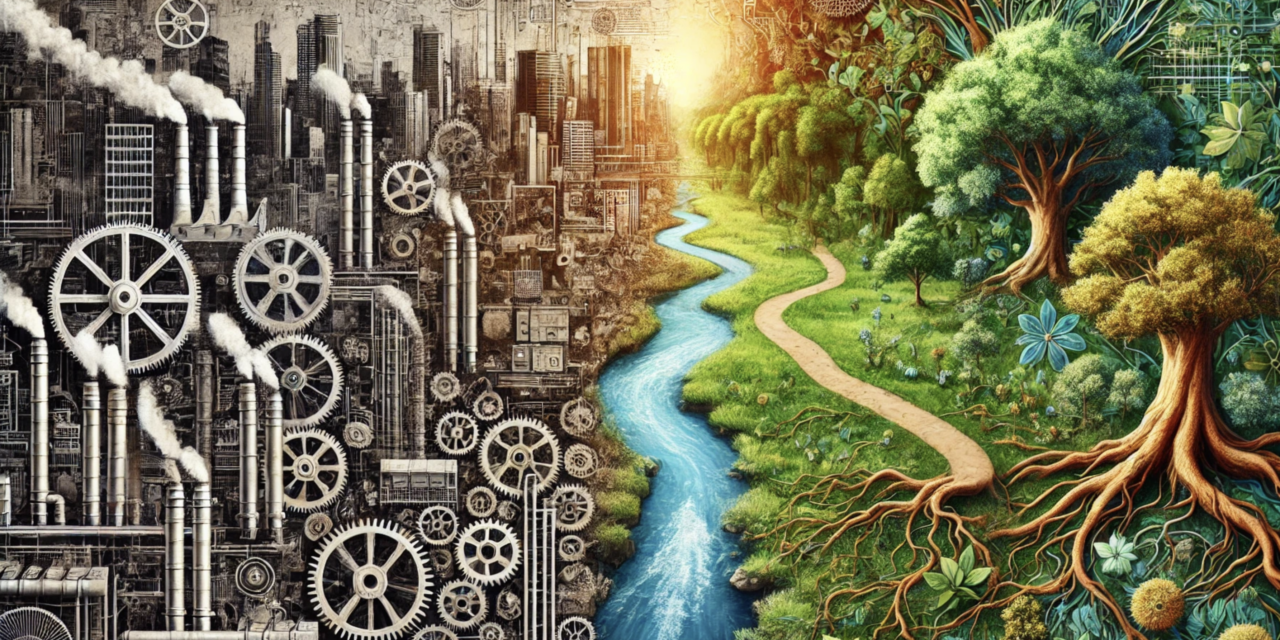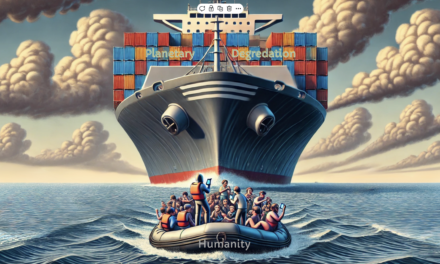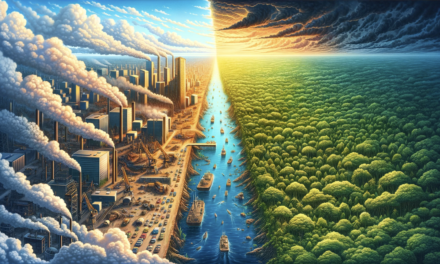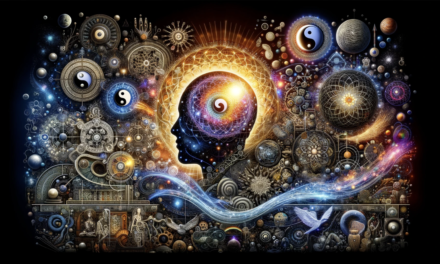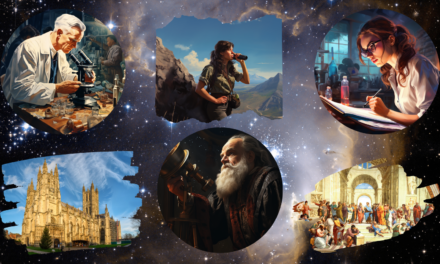Introduction
The world we live in is facing an extraordinary challenge. Climate change, ecosystem collapse, economic inequality, and geopolitical instability—these crises may seem disconnected at first glance, but they are all symptoms of something deeper. Together, they form what many now call the metacrisis: a tangled web of problems that threatens humanity’s survival and the health of our planet. To address it, we need to fundamentally rethink how we view and organize our society.
The core of this argument is deceptively simple: we’ve been thinking and acting like machines, but we’re part of a living system.
How Living Beings Function
Think about how your body works. At any given moment, your brain is managing what Lisa Feldman Barrett calls your “energy budget.” It constantly decides how to allocate the energy you consume, prioritizing what’s necessary for survival and what can help you prepare for the future. This process is dynamic, adaptable, and above all, wise—it balances short-term needs with long-term resilience.
For example, if you’re in danger, your brain reallocates energy to your muscles to help you escape. If food is scarce, your body slows its metabolism to conserve energy. These trade-offs ensure that you stay alive and have the best possible chance of flourishing in the long run.
Living systems, whether individual organisms or entire ecosystems, operate on similar principles. They balance and adapt. They work within limits, using energy wisely to maintain and grow.
How Society Functions
Now, contrast this with how human society operates. In theory, we should organize ourselves in ways that maximize our survival and flourishing—just as our bodies do. But instead of using energy as our guiding principle, we’ve chosen something else: money.
Money is how we decide what work gets done and where resources go. On the surface, this seems fine—after all, money is a tool. But the problem is that money doesn’t account for the real limits and needs of the world. It can be created infinitely, while energy, resources, and ecosystems are finite. And because money has become the primary driver, we’ve built a system that prioritizes wealth and GDP growth over survival and sustainability.
For example:
- We pour vast resources into weapons systems—called “defence”—while neglecting the very real threats of climate change and biodiversity loss.
- We allow industries to burn through energy and materials at unsustainable rates to produce goods many of us don’t need.
- We’ve designed global systems that consume energy and destroy ecosystems in the name of economic growth, even as these systems push us closer to collapse.
It’s as if we’re running our “society brain” on the wrong operating system. Instead of carefully managing our energy and resources like a living system, we’ve adopted the logic of machines: maximize output, efficiency, and control, no matter the cost.
The Danger of Machine Thinking
The philosopher Iain McGilchrist argues that this is a symptom of what he calls “machine thinking.” Machines, unlike living systems, operate in predictable, linear ways. They follow fixed rules, working in isolation to achieve specific goals. While machines can be useful, they are fundamentally different from living beings—and they cannot serve as models for how we should organize our societies.
Here’s the problem: when we think like machines, we create systems that are rigid, disconnected, and blind to the complex relationships that sustain life. Machine thinking leads us to:
- Treat nature as a collection of resources to extract, rather than a web of life we depend on.
- Pursue infinite growth on a planet with finite resources.
- Focus on efficiency and profit at the expense of balance, resilience, and well-being.
This kind of thinking has brought us to the brink of ecological and societal collapse. It is not sustainable, because it doesn’t align with how the real world—how living systems—actually function.
A Better Way: Thinking Like a Living System
If we want to resolve the metacrisis, we should stop thinking like machines and start thinking like the living beings we are. This means reimagining how we allocate resources, set priorities, and organize society. It’s not a small task, but it starts with a few key shifts:
- Energy, Not Money, as the Primary Driver
In living systems, energy is the ultimate currency. Society should adopt this principle, treating energy and resources as precious and finite. Instead of allocating resources to maximize profit, we should direct them toward ensuring survival and flourishing—both for humanity and the planet. For example:
- Transitioning to renewable energy systems that align with Earth’s natural cycles.
- Redirecting resources from destructive industries to regenerative ones, like biodiversity restoration and sustainable agriculture.
- Embracing Interdependence
Living systems thrive because they recognize relationships. Ecosystems are networks of interdependent organisms, and human societies are no different. We should design systems that prioritize collaboration, reciprocity, and shared well-being over competition and exploitation.
- Rebalancing Short- and Long-Term Thinking
The brain balances immediate needs with long-term resilience. Societies should do the same. This means investing in solutions that may not yield immediate profits but ensure a liveable future—such as climate resilience, education, and public health.
- A Cultural Shift
Machine thinking isn’t just a technical problem—it’s a cultural one. For centuries, we’ve celebrated control, domination, and efficiency. We need to shift our values to celebrate adaptability, balance, and care. This means:
- Valuing well-being over consumption.
- Educating ourselves and future generations about our place in the web of life.
Hope for the Future
The good news is that we already have examples of what this shift might look like. Indigenous cultures have long understood the principles of living systems, designing societies that work in harmony with nature. Scientists and innovators are developing technologies that mimic the wisdom of life, from regenerative agriculture to circular economies. And thinkers across disciplines—economists, ecologists, philosophers—are coming together to imagine a better way forward.
Humanity’s journey has been shaped by the same forces that guide all life. Like any species, we’ve sought to defend ourselves, secure resources, and adapt to challenges. But unlike other species, our capacity to innovate has made us a force of nature. Machines, born from our creativity, have amplified our ability to shape the world—for both good and ill.
This isn’t about blame. It’s about recognizing a pivotal moment in history. Just as we’ve shaped machines, we now have the chance to reshape how we think and act. By aligning our systems with the principles of life—adaptability, balance, and interdependence—we can move from merely surviving to truly flourishing as part of the living planet.
It isn’t a utopian dream, either. It’s a necessity. The metacrisis isn’t just a set of problems to solve—it’s a wake-up call, reminding us that we’re part of a living planet. If we can embrace this understanding, we have a chance to not only survive but to thrive.
It’s time to stop thinking like machines and start thinking like the living beings we are.
Terry Cooke-Davies
6th January 2025
Profound thanks to ChatGPT(4o) from OpenAI for assistance with this article.

